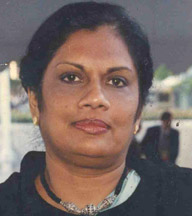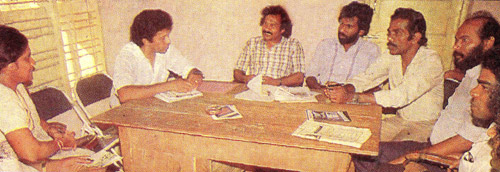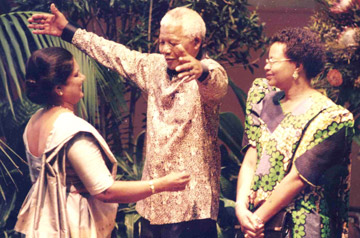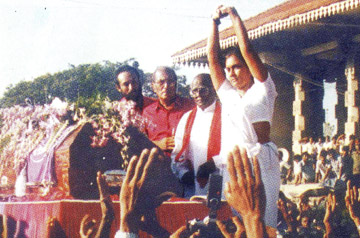I am now an activist for my country
Celebrating her 70th birthday, former President
Chandrika Bandaranaike Kumaratunga reminisces about the past, and looks
ahead to the future with a promise she will take to the streets to push
through reforms:
by Lakshman Gunasekara
 |
|
Chandrika Bandaranaike
Kumaratunga |
At 70 years age, she is still chubby-cheeked and grins mischievously
or, scowls expressively as she recalls some politico’s annoying action.
Press photographers loved her for her animated face that rendered her
photogenic, like her equally famous mother.
And it was by no means just photographers. Millions loved her while
some either were disillusioned or even hated her – often because she did
not live up to their expectations or ambitions or desires. After all,
who wouldn’t glamorize her for her meteoric rise to political power and
fame? ‘Meteoric’ because, after years in exile during the ‘terror’ of
the second JVP insurgency and equally ferocious counter-insurgency, with
her husband assassinated, she returned to re-build her mother’s party
and successively defeat the government at provincial, parliamentary and,
presidential levels.
In seventeen months, Chandrika Bandaranaike Kumaratunga, who had
never before contested electorally, rose from rookie politician to
Provincial Chief Minister, to Prime Minister and, then President.
Like her mother, in the context of a typically patriarchal political
establishment, Chandrika also achieved her own ‘firsts’ as a woman. She
was the first female Provincial Chief Minister and then, the world’s
first elected executive President. Some called her “Vihara Maha Devi”
and others called her “Chaura Rajina”.
 |
|
Chandrika Bandaranaike and
her husband Vijaya Kumaratunga with Tamil militant leaders in
Chennai |
Such epithets are unsurprising for a controversial and powerful
political figure.
Her charismatic leadership and her triumphant overthrow of a
repressive regime while, at the same time, her boldness in being the
first major Sinhala leader to meet the Tamil separatist militants in
peace initiatives gave her the stature of a national heroine reminiscent
perhaps of the mythical Vihara Maha Devi.
But ‘Chaura Rajina”? While that epithet was bestowed on her by a
single writer, history is yet to give the final verdict on the degree of
Chandrika’s straying from propriety and good governance.
After all, if deceit is the criteria for that epithet, surely there
have been other male leaders who deserve it more for their grander scale
of deceit and prolific duplicity – duplicity to which even Foreign
Ministers of neighbouring powers were victim?
Q. What were things in your childhood that guided you to your
historic role in politics?
A. I was rebellious from my childhood and known as a naughty
girl. I remember that even in my dancing class I was considered
mischievous. Ranil (Wickremesinghe) was in the same dancing class, by
the way. But in school I was also studious and was given a double
promotion in my primary school. My subsequent life experiences surely
helped in developing my understanding of politics and power.
My father was assassinated while I was quite young. In fact you could
say that I lost both my parents because my mother was compelled to give
up much of her parenting role to devote her time to government and
running the party. Of course, she made sure that we had all our needs,
but from an early age we lost that intimate mothering that other
children enjoyed due to her commitment to government and serving the
country.
Q. Your higher education in France also led you towards
radical politics .. ?
A. Definitely. I won a scholarship to one of France’s most
prestigious colleges – the Institute of Political Science at the
University of Paris – just at the start of the radical Left student
movement in Europe. I was in the middle of the 1968 student revolution
in Paris. It was a time of romancing the revolution.
 |
| Meeting Nelson
Mandela |
 |
| At her
husband’s funeral |
We were keen about our studies and also about our role in society and
in social change. My own studies focused on social transformation in the
Third World which where I came from. Our student life also conditioned
us to a very practical life style.
I did volunteer work house cleaning in the student hostel.
I also earned pocket money with part time work as a bar maid,
receptionist. I was later elected vice president of the house student
committee.
Q. So you were well equipped for politics on your return home?
A. I did not take up formal politics on my return. I am not
that focused on political office and formal political power. Rather,
given my Leftist leanings, I wanted to be involved with people, with
mass politics. Being a political animal, I plunged into organizing the
party and building mass organizations.
My stay in Paris also made me interested in journalism and the media.
I helped start up and managed the SLFP’s ‘Dinakara’ newspaper which was
very successful at the time. My mother gave me Rs 200,000 for that and
we managed with it. Despite not getting advertising, the ‘Dinakara’
survived for some time because we managed it well.
With my sense of mass politics, I enjoyed helping my mother build the
party.
When we came to power in 1970, I did not take up any political
office. I preferred to do organizational work and got involved in
development programs. My mother and other party leaders had persuaded me
to give up my half-finished doctoral studies and work in politics here.
Q. Is that how you came into the Land Reform initiative?
A. Yes. Hector Kobbekaduwa was leading the land reform program
and he told me to help him. He said that with my knowledge derived from
rural development studies and third world studies – especially my thesis
focus on land reform in socialist Tanzania – I could play a big role in
the country’s land reform program. That’s how I came to take up a role
in the Land Reform program.
I was first an Assistant Manager in the Janavasama Commission
(collective farms programme) and later became the Director.
I was selected on merit and not because of any connections. I enjoyed
that work. We helped settle ex-JVP youth in these farms which were part
of our agricultural development strategy at the time. Some of those
farms were very successful.
Q. As a Marxist yourself, how did you see the JVP uprising of
1971?
A. The JVP of that period were not that convincing to me given
their very limited vision. Some friends invited me to join the JVP and I
had some discussions. I found that their class analysis was limited to
what they called the Five Classes. You cannot understand society and the
strategy for social change with such limited concepts. I thought that
they were adventuristic, although their ideals were great.
Q. How did you meet up with Vijaya?
A. We got close when he was nominated by the party to contest
the 1977 elections. It was he who got interested in me and began to
visit me in Horagolla using any excuse. We really saw eye to eye on many
things. When he was killed I was devastated but not frightened. But the
family pushed me to go abroad for the sake of the children.
Q. That was your period of exile in London?
A. Yes. For some time, my friend Ronnie Peiris sub-let his
flat in London to me. I wanted to have my independent life.
Q. Some in the party today accuse you of abandoning the SLFP
at that time…?
A. I did not abandon the SLFP at any time. I was consistent in
my politics.
It was a group inside the party – Maithripala (Senanayake) and
Mahinda included – who connived to push me out of the party. My brother,
Anura, was also taken in by them.
Even at that time, Mahinda relied on astrology and believed that he
was destined to lead the party. On my return, I formed the SLMP (Sri
Lanka Mahajana Party). Rajitha actually joined later.
Q. How is it that a criminal personality like Baddegaana
Sanjeeva got involved as your bodyguard.
A. I did not know about him till much later. During the time
of the JVP insurgency, my mother got the help of some retired military
officials to organise security for me. It was they who recruited and
trained various people including Sanjeeva. It was much later that I
learnt about his criminal behaviour.
Q. During your presidency some journalists criticised you for
authoritarian behaviour. One even wrote a book about your presidency
titling it ‘Chaura Rajina’.
A. That book was not taken seriously by anyone. It was written
with the support from Mahinda. Did you read it? Did you see that it was
full of contradictions?
Q. You have been a strong critic of the Rajapaksa regime. Yet,
he was your successor to the party leadership. Why couldn’t you find
someone more to your liking to succeed you?
A. We had several possibilities – including Maithripala – but
none were willing to take on the role at the time. So the party had to
go with Mahinda. Mahinda lacks self-confidence and that is one reason
for his authoritarian behaviour and his antagonism towards me.
Q. When did you first get involved in moving against the
Mahinda regime?
A. About three years ago. For some time, many people I met had
been urging me to make a come-back to save the situation.
I am not interested in political office or power. But I began to act
to save the situation and save the party. So we began dialogues with
various people and groups, including political parties. At a later stage
we also began talking with the UNP.
Everyone was very worried about the way the country was going. No one
wanted this crisis and people began urging me to act before it was too
late. In fact some wanted me to re-enter politics but I refused. I am
now an activist for my country and society. I don’t need power. I want
to empower others to come forward and do the right thing.
Q. When did you work out the strategy with Sirisena?
A. I began to talk to Maithripala also about three years ago
through proxies. We did not want to be seen together because Mahinda
would react. About a year ago, we decided that the time was right to
build a movement.
Q. You kept all this undercover until the final weeks. How did
you manage it?
A. That story will be told later, in safer times. We worked
through various proxies. Only very few people knew what was happening
although others suspected. Cannot reveal names because, unlike me who
has security protection, ordinary citizens are vulnerable today. Still
those former dictators and their cronies have influence .
Q. There is a likelihood that Parliament will be dissolved
before the 20th Amendment is passed. Do you have faith that the new
Parliament will proceed with this reform?
A. Yes. I have faith that the current coalition and leadership
are committed to reform. Ranil is my friend and I trust him to take
things forward in collaboration with my party and the other progressive
parties and groups. There is also a social movement in support.
Q. But if the new Parliament fails ..?
A. Then I will join in the struggle to take the reform
forward. I will take to the streets. |

